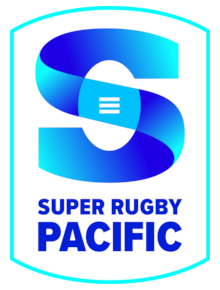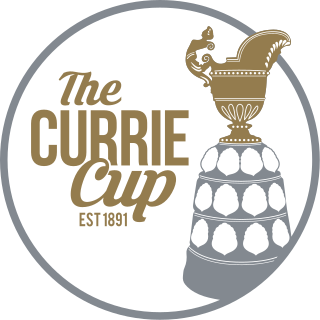
Super Rugby is a men's professional rugby union club competition involving teams from Australia, Fiji, New Zealand, and the Pacific Islands. It has previously included teams from Argentina, Japan, and South Africa. Super Rugby started as the Super 12 in the 1996 season with 12 teams from Australia, New Zealand, and South Africa, building on competitions dating back to the South Pacific Championship in 1986. The Super 12 was established by SANZAR after the sport became professional in 1995. After the COVID-19 pandemic forced the competition to split into three, the reformed competition in 2021 only included teams from Australia, New Zealand and the Pacific islands.

The Currie Cup is South Africa's premier domestic rugby union competition featuring teams representing either entire provinces or substantial regions within provinces. Although it is the premier domestic competition, four South African franchises also compete in the United Rugby Championship competition, including for the 'South African Shield'. for the highest placed South African team.

The Lions is a South African professional rugby union team based in Johannesburg in the Gauteng province. They competed in the Super Rugby competition until 2020, and have competed in the United Rugby Championship since 2021. They are the successor of the teams known as Transvaal (1996), Gauteng Lions (1997) and the Cats (1998–2006).

The South African Rugby Union (SARU) is the governing body for rugby union in South Africa and is affiliated to World Rugby. It was established in 1992 as the South African Rugby Football Union, from the merger of the South African Rugby Board and the non-racial South African Rugby Union (SACOS), and took up its current name in 2005.

The Cheetahs, is a South African professional rugby union team based at the Free State Stadium in Bloemfontein. They have played Super Rugby between 2006 and 2017, then the Pro14 from 2017 to 2020, and currently the EPCR Challenge Cup since 2022.

The Golden Lions are a South African professional rugby union team based in Johannesburg who compete in the annual Currie Cup and Rugby Challenge.
The 2006 Super 14 season started on 10 February 2006. The Grand Final was held on 27 May 2006. Super 14 is a provincial rugby union competition with 14 teams from New Zealand, Australia and South Africa. This season was the first of the expansion, which saw two new teams, the Western Force and the Cheetahs, join the Super 12/14. The addition of two new teams led to the name change from the Super 12. It was also the first year for a new Super 14 trophy.
The 2007 Super 14 season started in February 2007 with preseason matches held from mid-January. It finished on 19 May with the final at Kings Park Stadium in Durban, in the first final between two South African teams in the history of Super Rugby. The visiting Bulls won the 2007 Super 14 Final, scoring a try in the 83rd minute and narrowly defeating the Sharks 20–19, thereby becoming the first South African side to win the Super Rugby title in the professional era.
The 2006 ABSA Currie Cup season was contested from June through to October. The Currie Cup is an annual domestic competition for rugby union clubs in South Africa. The tournament was controversial before it even began, with the Southern Spears saga regarding entry into the Super 14 and Currie Cup continuing.

Christoffel Johannes van der Linde is a South African former professional rugby union player and currently the scrum coach at French Top 14 side Montpellier. He played first class rugby between 2002 and 2015 in South Africa, Ireland, England and France and also made 75 test matches for South Africa, which included winning the 2007 Rugby World Cup. His usual playing position was prop.
Lucas "Kabamba" Floors is a former South African rugby union footballer, who made in excess of 200 appearances during his playing career. He started and finished his career at the SWD Eagles, making 33 appearances for the George-based outfit between 2003 and 2004 and a further 17 appearances in 2013. He spent the bulk of his career in Bloemfontein, representing the Free State Cheetahs in the domestic Currie Cup and Vodacom Cup competitions and the Cheetahs in Super Rugby. His usual position is on the flank, although he occasionally plays at number eight, and was once selected on the wing. Floors made a single appearance for the national team, the Springboks, in 2006 and played for the national rugby sevens team between 2003 and 2006, also captaining them in 2006.
Luke Asher Watson is a South African former rugby union footballer who can play at flank or eighthman. He has represented and captained the South African Schools rugby team (2001), South Africa's under-19 (2002) and under-21 (2004) teams, as well as the Springbok Sevens team (2001). Watson has also captained both the Western Province and the Super Rugby Stormers. He most recently played for the Eastern Province Kings.

Heinrich Wilhelm Brüssow is a South African former professional rugby union player. His usual position was as open-side flanker and his most recent club was Northampton Saints in the English Premiership.
Steven Robert Sykes is a South African former rugby union player. He played for Oyonnax in the French Top 14. His regular position was lock.

The Southern Kings were a South African professional rugby union team that competed in Super Rugby and Pro14. They were based in Port Elizabeth in the Eastern Cape province and played their home matches at Nelson Mandela Bay Stadium. They were created in 2009, and had their first match against the British & Irish Lions during their 2009 tour. After competing in Super Rugby in 2013, 2016 and 2017, they joined Pro14 prior to the 2017–18 season, along with the Cheetahs.
The Super Rugby competition in rugby union, including teams from Australia, Fiji, New Zealand and the Pacific Islands and, in the past, from Argentina, Japan and South Africa, is based on a "franchise" system of teams. The original member countries – Australia, New Zealand and South Africa – all have several regional franchises, while the expansion countries – Argentina, Fiji, Japan and the Pacific Islands – have/had one franchise each. The article covers specific detail as to the areas covered by each Super Rugby team. Bold denotes stadiums that are current primary stadiums for the franchises.
Davon Stephanus Raubenheimer is a former professional rugby union rugby player. His regular playing position is flanker.
Hanyani Masana Shimange is a former professional rugby union player. His position of choice was hooker, but he played one game for the Springboks at flank.
Seabelo Mohanoe Senatla is a South African rugby union player for the South African Sevens Side. He also plays for Stormers in URC and Western Province in the Currie Cup. His regular position is winger.
Jacques Nienaber is a South African rugby union coach who is currently the senior coach at Leinster. He led South Africa to their 4th World Cup title in 2023.









